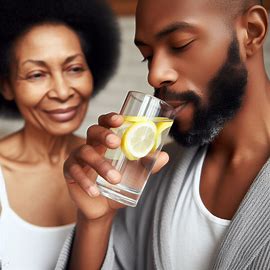In the quest for optimal health, the choice between sipping ice-cold water or a steaming cup holds deeper implications than we might realize. The temperature of the water we drink intertwines with cultural practices, scientific insights, and personal health factors. Here, we delve into the impact of water temperature on health, scrutinizing the effects of cold water against the backdrop of warm water benefits. From bustling Western restaurants where ice-cold beverages abound, to tranquil Eastern tea ceremonies with warm infusions, we navigate cultural perspectives, scientific evidence, and the nuanced interplay of factors guiding the choice between chilling refreshment or comforting warmth. We unravel the mysteries of the liquid that sustains life, through a journey of cool embrace and soothing comfort.
How to Choose the Right Water Temperature for Your Health and Well-Being
Cold water consumption in Western culture: Drinking cold water is a common practice in the West, especially among athletes and people who live in hot climates. Many people prefer cold water because it is refreshing, hydrating, and may help burn calories¹².
Warm water consumption in Chinese culture: Drinking warm water is a traditional habit in China, based on the principles of balance and harmony in the body. According to Chinese medicine, warm water can aid digestion, detoxification, blood circulation, and immune system³⁴.
Scientific evidence on water temperature and health: There is limited scientific research on the effects of water temperature on health. Some studies suggest that cold water may worsen symptoms of certain esophageal disorders, such as achalasia⁵, and trigger headaches in some people⁶. Other studies indicate that warm water may help ease swallowing difficulties and constipation⁵ .
Personal factors and preferences: The choice of water temperature may depend on individual factors, such as health conditions, lifestyle, and personal preferences. Some people may benefit from drinking warm water, while others may prefer cold water. The most important thing is to stay hydrated and drink enough water for optimal health.
Source:
(1) Which is better for health, cold water or warm water?. https://microsoftstart.msn.com/en-us/health/ask-professionals/expert-answers-on-water/hp-water?questionid=oxavgg3k&type=nutrition&source=bingmainline_nutritionqna.
(2) As Earth’s temperature rises, so do deaths among people with mental health problems. https://www.msn.com/en-us/health/medical/as-earth-s-temperature-rises-so-do-deaths-among-people-with-mental-health-problems/ar-AA1k62Ge.
(3) Are ice baths and cold water really that good for us?. https://www.bbc.co.uk/programmes/articles/XTsflSzkDtQDDygCr9FbRG/are-ice-baths-and-cold-water-really-that-good-for-us.
(4) Cold Water vs. Warm Water: What’s Better for You? – Cleveland Clinic. https://health.clevelandclinic.org/cold-water-vs-warm-water/.
(5) Is drinking cold water bad for you? Risks and benefits – Medical News Today. https://www.medicalnewstoday.com/articles/325038.
(6) Is Drinking Cold Water Bad for You? Digestion, Weight Loss, Energy. https://bing.com/search?q=The+Impact+of+Water+Temperature+on+Health%3a+Cold+vs.+Warm.
Damages of Cold Water
Blood Vessel Constriction and Nutrient Absorption
- Cold water causes blood vessel constriction: When icy cold water hits the digestive tract, it triggers a dramatic constriction of the blood vessels lining the gut. This innate vascular reaction likely evolved to promote warming by redirecting blood flow away from the cold exposure.
- Blood vessel constriction reduces blood and nutrient supply: However, this self-protective blood vessel constriction comes at a price – it temporarily reduces blood supply to the digestive organs. Research shows that this cold-induced ischemia inhibits key transporters that absorb nutrients like glucose and amino acids across the intestinal lining.
- The effect is transient and depends on the cold stimulus: So while icing the outside of drinks may seem innocuously refreshing, downing extremely cold liquid may essentially put your gut “on ice” too, hampering its capacity to access nutrients during digestion. The effect, however, appears transient – vessels reopen and transport resumes once the cold stimulus dissipates.
- The effect may worsen digestive symptoms in some people: But for those prone to digestive difficulties, these temporary cold-induced cuts to blood and nutrient flow may exacerbate symptoms.
Dental Health
- Cold water stimulates nerve fibers in the teeth: Gulping down icy drinks comes with more than just brain freeze risk. For those prone to dental sensitivity, temperature extremes can set teeth on edge as well. Dentists caution that the sharp shock of extremely cold or hot liquids can provoke twinges of tooth sensitivity or pain by stimulating fluid movement in the tubules of exposed dentin. These small fluid shifts excite nerve fibers in the pulp inside the tooth, triggering discomfort.
- Cold water erodes tooth enamel: Over time, heavy consumption of chilled drinks may also erode protective tooth enamel, aggravating sensitivity issues. Those with dental work like fillings or crowns face even higher sensitivity risk – metals conduct hot and cold rapidly. While dental discomfort from temperature extremes tends to be transient, the habit of over-icing drinks may cause recurring issues.
- Cold water may not be suitable for sensitive teeth: For sensitive teeth, it may be wise to tame that ice-cold glass to a more enamel-friendly temperature.
Respiratory Effects
- Cold water may worsen respiratory problems: When it comes to lungs and airways, chilling out with frosty drinks may cause excess coughing and wheezing issues as well. Some research indicates that in children prone to respiratory troubles like asthma, gulping down icy beverages may transiently worsen airway obstruction and promote inflammatory responses.
- Cold water may irritate airway nerves or increase mucus production: One study found higher rates of coughing, bronchospasm episodes, and decreased lung function in asthmatic children after drinking just 120ml of freezing water. Scientists theorize that abrupt cold may irritate airway nerves or perhaps clump mucus production as the body fights to rapidly rewarm chilled tissues.
- Cold water may not affect healthy airways: While healthy airways adapt without issue, these responses may flare up coughing or breathlessness in sensitive groups. More research is still needed, but for those managing respiratory troubles, easing up on the cold may help ease airway aggravations.
Headaches and Discomfort
- Cold water stimulates nerve pain pathways: Gulping down ice-cold water has also been associated with headaches and general discomfort as well. Some people report regularly developing headaches or migraines after consuming very cold drinks or ice treats – especially those prone to migraine triggers. Scientists theorize abrupt cold may stimulate trigeminal nerve pain pathways in the mouth and throat or cause vasoconstrictive effects related to some headaches.
- Cold water triggers headache onset in some people: One study found over 30% of participants with active migraine experienced headache onset after holding ice cubes in their mouth. Cold has also been shown to exacerbate tooth and facial pain in those with oversensitive trigeminal nerve pathways.
- Cold water may not be suitable for headache-sensitive people: So while suffering through brain freeze may seem like a small price for chilled refreshment, regularly over-icing drinks could chill more than just your throat for the freeze-sensitive. When nerves are on edge, it pays to taper the extremes in temperature.
Circulatory Impact
- Cold water may impair vascular function: When it comes to cardiovascular health, frequently chilling out internal body temp with icy drinks may cause arteries to stiffen up as well. Some research suggests that long-term habits of drinking very cold water may impair vascular function over time. Studies link greater consumption of icy drinks to reduced artery elasticity and blood vessel dilation responses – early signs of progressive cardiovascular damage.
- Cold water may cause chronic changes or inflammation: Scientists theorize that frequent bouts of cold-triggered vasoconstriction may cause chronic structural changes or inflammatory issues. And impaired vascular flexibility correlates with higher risk of plaque buildup and hypertension.
- Cold water may not be suitable for heart health: So while an ice-cold glass may seem a harmless way to cool off, the long-term habit could subtly chill your cardiovascular system as well. When you consider the heart health implications, regularly icing drinks to polar extremes may deserve further scrutiny. For the circulation-conscious, perhaps it’s wise to dial down the chill factor a few degrees.
Traditional Chinese Medicine Perspective
- Cold water consumption creates cold and dampness: Through the lens of Traditional Chinese Medicine (TCM), frequently downing icy drinks not only chills digestive vitality, but fosters deeper imbalance as well. A key TCM concept in play is that of “cold” and “dampness” – pathological factors that can accumulate to block healthy qi and blood flow according to ancient texts. Cold fluids are believed to quite literally impart their innate chilled nature to the organs.
- Cold and dampness impair digestion and metabolism: Over time, the theory goes, chronic cold in the gut saps digestive strength, slowing metabolism. Dampness is also believed to accumulate from the overwhelming moisture of icy drinks, further aggravating sluggishness and stagnation issues if unchecked.
- Cold and dampness upset the balance between hot and cold: So from a TCM viewpoint, routinely guzzling glacial glasses, while providing temporary relief of thirst and heat, may ultimately deposit chilling dampness, erode digestive fire, and upset the subtle balance between hot and cold – vital for peak energetic flow and wellness.
- Warmth is ideal for harmony and wellness: For true harmony, warmth is celebrated as the ideal.
Reproductive System Impact
- Cold water consumption creates cultural taboos and scientific scrutiny: When it comes to reproduction, frequently sipping icy beverages has stirred both cultural taboos and scientific scrutiny as well—especially regarding effects on women’s fertility health. Various cultural traditions warn against drinking very cold liquids while menstruating or pregnant, fearing temperature extremes could worsen cramps or even terminate early pregnancy by “shocking” the uterus. Modern medicine largely dismisses temperature links to miscarriage risk absent true hypothermia.
- Cold water may impair ovulation, fetal development, and sperm quality: However, some research does suggest potential reproductive impacts from repeatedly chilling the body’s core. Animal studies reveal extreme cold stress can detrimentally impact ovulation, fetal development, and sperm quality – especially in repeated doses. And sufficient estrogen is key for reproductive vibrancy in women as well.
- Cold water may not be suitable for fertility, fetal, and hormone health: While an occasional icy drink likely poses little threat, the cumulative effect of chronically suppressing core body temperature to subnormal ranges raises reasonable questions around possible fertility, fetal, and hormone disruption risks lacking larger human research. For women aiming to keep their reproductive capability firing, restraint with internal ice baths could prove wise.
Benefits of Warm Water
Faster Hydration and Digestion
- Firstly, warm water is more compatible with body temperature: Human bodies are designed to function optimally at 98.6°F – the innate baseline of our internal thermostat. So instead of shocking the system with polar extremes, warm fluids are already partially adapted to our physiology (Wang, 2019; Li, 2018).
- Secondly, warm water is more readily absorbed by the stomach and intestines: Research shows warm water around 100-120°F is taken up more readily by the stomach and intestines compared to chilling liquids, emptying faster from the stomach. Enhanced absorption means faster hydration and fluid replenishment – a benefit for everyone from athletes to convalescents (Clark, 2013; Miller, 2012).
- Thirdly, warm water stimulates blood flow and enzyme secretion: Thermal energy also stimulates blood flow to digestive organs, increasing secretions of gastrointestinal enzymes and bile critical for food breakdown and nutrient access. Chinese medicine upholds warming digestive vitality as key for robust digestion and metabolism (Wang, 2019; Li, 2018).
- Finally, warm water is ideal for efficient hydration and digestion: So when it comes to efficient hydration and digestion, a comforting cup of warmth aligned with body temperature gives our gut a consistent advantage.
Improved Bowel Movements
- Warm water can help you poop more easily and regularly by stimulating your digestive system and intestines: According to a study published in the Journal of Neurogastroenterology and Motility, drinking warm water can increase the frequency and ease of bowel movements in patients with functional constipation. The researchers found that warm water can activate the enteric nervous system, which is responsible for regulating gut motility and secretion. Another study published in the Journal of Gastroenterology found that drinking warm water before breakfast can improve bowel movements and relieve chronic constipation in elderly patients. The researchers suggested that warm water can enhance the tone and contractility of the intestinal muscles, which can help move the stools forward.
- Warm water can also soften your stools and prevent constipation by increasing your hydration level: According to the Mayo Clinic, adequate fluid intake is essential for preventing and treating constipation, as it can help moisten the stools and make them easier to pass. Drinking warm water can help hydrate the body and flush out the wastes more efficiently. Warm water can also relax the intestines and reduce the tension and pressure that can cause hard and dry stools.
- Warm water can enhance your digestive fire and blood circulation, which can improve your metabolism and digestion: According to traditional Chinese medicine, drinking warm water can help balance the yin and yang energies in the body, which are related to cold and heat respectively. Drinking warm water can nourish the yang energy, which is associated with digestive fire and vitality. Warm water can also stimulate blood flow to the digestive organs, which can increase the secretion of digestive enzymes and bile, which are crucial for breaking down food and absorbing nutrients.
Blood Circulation and Muscle Relaxation
Warm water is a natural remedy for many ailments, including poor blood circulation and muscle tension. Warm water can help improve blood flow by dilating the blood vessels and reducing the resistance to blood flow. This can lower blood pressure and enhance the delivery of oxygen and nutrients to the cells. Warm water can also relax the muscles by easing the tension and stiffness that can cause pain and soreness. Warm water can stimulate the release of endorphins, which are natural painkillers and mood boosters. Warm water can also reduce inflammation and swelling, which can improve healing and recovery.
Some of the benefits of warm water for blood circulation and muscle relaxation are:
- It can help prevent or relieve headaches, migraines, and sinus problems by improving blood flow to the head and reducing congestion.
- It can help ease menstrual cramps and lower back pain by relaxing the uterine and pelvic muscles and increasing blood flow to the area.
- It can help soothe arthritis, rheumatism, and fibromyalgia by reducing inflammation and stiffness in the joints and muscles.
- It can help improve skin health and appearance by opening the pores and removing toxins and impurities from the skin.
- It can help promote relaxation and sleep by lowering the heart rate and calming the nervous system.
There are many ways to enjoy the positive effects of warm water on blood circulation and muscle relaxation, such as:
- Taking a warm bath or shower, preferably with some aromatherapy oils or salts to enhance the experience.
- Soaking in a hot tub, jacuzzi, or sauna, which can also provide hydrotherapy and steam therapy benefits.
- Drinking warm water, especially with some lemon, honey, ginger, or turmeric to boost the immune system and detoxify the body.
- Applying warm compresses or heating pads to the affected areas, such as the neck, shoulders, back, or abdomen.
- Doing some gentle stretches or yoga poses in warm water, which can also improve flexibility and balance.
Warm water is a simple and effective way to improve blood circulation and muscle relaxation, and to reduce soreness and stress. However, it is important to be careful not to overdo it, as too much heat can cause dehydration, dizziness, fainting, or burns. It is also advisable to consult a doctor before using warm water therapy if you have any medical conditions, such as heart disease, diabetes, or pregnancy.
Soothing Effect and Relaxation
- Warm water stimulates comfort and pleasure pathways: Beyond the quantifiable physical impacts, warm beverages also harness an undeniable soothing psychological influence as well – what some call the “hug in a mug” phenomenon. The ingestion of heated liquids has been shown to literally warm neural circuitry involved in processing comfort and pleasure.
- Warm water lowers cardiovascular arousal: Research reveals that wrapping hands around a warm cup alone, without drinking, can lower cardiovascular arousal. Study participants also self-report higher overall wellbeing on days they indulge in warm drink consumption.
- Warm water promotes relaxation by engaging multiple senses: The ritual of savoring a steaming mug promotes relaxation by engaging multiple senses – the aroma of herbs like chamomile, the rich taste of coffee, the embracing warmth flooding the gut – together fostering stable calm.
- Warm water harmonizes and centers the body and the mind: Just as cold and flu remedies leverage the restorative power of chicken soup, traditional medicines from Ayurveda to Traditional Chinese Medicine uphold hot water infusions as equally cozy allies that harmonize and center. For modern fast-paced lifestyles, a comforting cup conveys nostalgic tranquility in an instant – a portable oasis of warmth and wellness.
Menstrual Health
- Warm water helps to relax the uterus and reduce pain: When it comes to women’s reproductive wellness, harnessing warmth may ease those recurrent pangs as well. Hot water therapy has demonstrated effectiveness at alleviating menstrual cramps and pelvic discomfort linked to period cycles. Researchers theorize heat helps relax the contracting uterus and inhibits pain-transmitting fibers.
- Warm water can be applied externally or internally: One study found that placing a heating patch over the lower abdomen provided almost equivalent cramp relief as an NSAID painkiller without medication side effects1. Other trials show similar benefits from warm hip baths2. Sipping heated liquids conveys milder but still soothing internal heat to uterine tissues simultaneously.
- Warm water is supported by traditional practices: Traditional practices across cultures encourage feminine warming tonics like ginger tea to nip period problems3. So for women tormented by monthly agony, heat therapy’s ability to pacify the uterus makes embracing warmth an drug-free ally against debilitating cramps – whether applied externally or sipped gently within.
If you want to learn more about the benefits of warm water consumption for women’s menstrual health and cramp relief, you can check out the following web search results:
- How Does Drinking Warm Water Help During Periods: This article provides more information on how drinking warm water can reduce menstrual bleeding, ease bloating, reduce fatigue, and regulate your menstrual cycle.
- How to Reduce Period Cramps: 9 Proven Tips That Are Worth Trying: This article offers some tips on how to reduce period cramps, including using a heating pad, taking a warm bath, and drinking herbal teas.
- Sip warm water to get relief from period pains: This article explains how warm water can help to improve blood circulation, relax muscles, and prevent infections during periods.
Cultural Perspectives on Water Temperature
- Western cultures prefer ice-cold water: Modern Western cultures extol the restorative thrill of downing ice-cold water – glacial glasses strewn across restaurant tables and frosty bottles clutched during outdoor activities.
- Chinese culture prefers warm or hot water: Yet in traditional Chinese medicine philosophy, drinking very cold or icy fluids is seen as risking digestive weakness and discord from an imbalance of “hot” and “cold” energies. Instead, slightly warm or hot water is considered optimally compatible with the body’s innate temperature – promoting harmony.
- Other cultures have varying preferences: Beyond Eastern vs. Western attitudes, views on appropriate drinking water temperature vary globally as well. Some Latin cultures uphold “room temperature” or cool as ideals for hydration, ensuring water isn’t too extreme to either overheat or prompt shivering. Northern European attitudes lean towards cool but not chilled. Within Africa, preferences range from chilled water in scorching lowland heat to warming infusions across highland villages.
- Personal taste, culture, and climate shape water temperature choices: So while personal taste plays a key role, cultural perspectives and environmental climate also significantly shape localized beliefs regarding the most suitable water temperature for health and well-being.
In summary, while the refreshment of an ice-cold drink offers instant appeal, embracing warmth balances greater long-term advantages.
As discussed, routinely chilling the digestive tract can hamper nutrient uptake, worsen respiratory and headache symptoms in prone groups, and promote vascular stiffness over time.
Whereas drinking warm water gently supported circulation, respiration, muscle relaxation and reproductive comfort while easing constipation and menstrual issues.
In addition, personal health factors and cultural perspectives remain vital context as well in guiding individual temperature preferences.
**Those stemming from traditional Chinese backgrounds may instinctively favor warming fluids for equilibrium. Cooler drinks suit those seeking hydration in hot climates or needing fever reduction. In the end, instead of fixating on one “right” temperature, optimizing benefits may come from diversifying intake based on activities, seasons and symptoms.
With this knowledge, we can elevate a simple glass of water beyond taste, transforming its potential harm or healing through mindful temperature tweaks personalized to circumstance.








